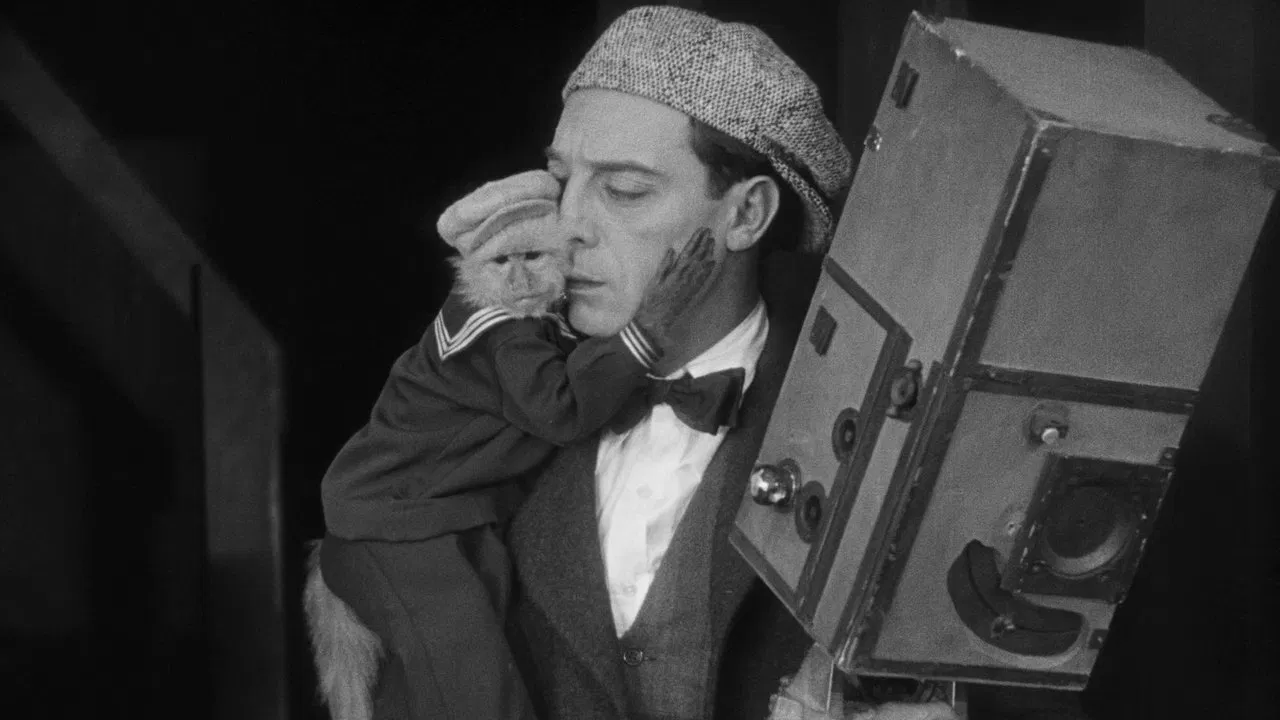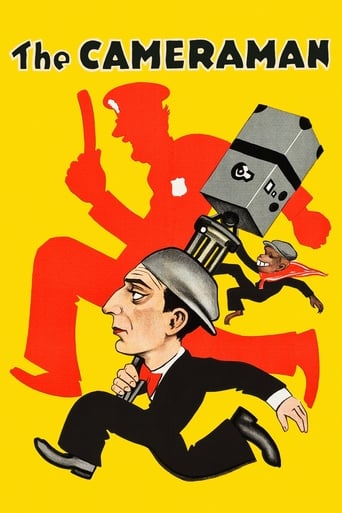

Rollicking silent-era comedy from Buster Keaton.Simple yet engaging plot. However, its not the main story that matters, but the many detours on the journey. The whole thing is one random, funny adventure.Some moments of pure genius from Keaton. The dime bank scene was one, and the whole swimming pool scene was another.Great work from Keaton in front of the camera. Good support from Marceline Day. However, the show is almost stolen towards the end by Josephine, the monkey...
... View More. . . a decade before MGM got all uppity from GONE WITH THE WIND (which I always suspected was mostly filmed by junior members of the primate family, who probably also wrote the script for GWTW's mendacious opening scroll). As the title character of THE CAMERAMAN, Buster Keaton was hired to represent the average Tinsel Town filmmaker. He's a constant bumbler in this role, breaking MGM's stenciled glass door panel six times with his camera tripod. On one of his rare excursions outside, Keaton blindsides and knocks unconscious an organ grinder's Capuchin monkey. As soon as the abandoned midget primate regains consciousness, he commandeers Keaton's camera and shoots the "best footage" MGM's boss has "seen in years," despite being woozy and saddled with the most antique camera the city has to offer. Naturally, Specism prompts the MGM mogul to assume Keaton deserves all the credit, and the REAL cameraman finishes his big day out as an unsung (and unemployed) hero. Obviously, it turns out that THE COVE and BLACKFISH were not the first flicks to document mammal abuse!
... View MoreI understand why people want to call "The Cameraman" Buster Keaton's last silent film: It makes for a helluva swan song before a hellacious fall, not to mention a powerful and hilarious example of Buster's screen persona's drive and moxie against terrible odds."No one would ever amount to anything if they didn't try," Buster is told early on by the woman he is trying to court by taking up the job of newsreel cameraman. Telling him about his movie camera, but perhaps about life, too, she urges him: "You must always grind forward, not backward.""The Cameraman" is all about grinding forward. To make it in the newsreel business, and impress fair Sally (Marceline Day), Buster's character has to endure a lot. It's tempting to draw a connection, as one often does with Buster, between his art and his real-life situation. In 1928 he was being forced to adapt to a new way of doing things at big studio MGM, and even had to hand over the director's chair to Edward Sedgwick, though Keaton clearly contributed.In his art, if not in life, Buster could always beat the odds. That he does here is no surprise; it's the way he does it that satisfies me so. MGM wanted Buster to play more for audience sympathy, and here he manages to do so without surrendering his keen comic edge. Day was a very typical MGM ingénue in the Norma Shearer mode (Shearer herself can be glimpsed on a city billboard right after Buster falls off a bus), but she makes that work, her eyes matching Buster's for the way they absorb pain and disappointment.Comedy usually suffers when the comedian plays for the heartstrings; not this time. Buster keeps the laughs coming, from all directions. You alternately get a comedy of manners (Buster trapped in a women's drawing room) slapstick (Buster shares a dressing room with a portly grouch), sex comedy (Buster loses his bathing suit in a pool while out on a date with Sally), action comedy (Buster finds himself covering a gang war) and animal humor (a monkey named Josephine whose adoption of Buster provides the last third with a high-octane kickstart.) The only thing you don't get is a signature Keaton chase!The focus on Buster and Sally pays off, with a simple but effective plot that piles indignity after indignity upon our hero and dares him to keep grinding forward. He's so dogged it is rather funny even as it remains affecting. So lost in reverie is Buster at the prospect of a date with Sally that he walks up the staircase of his apartment building right past his apartment and to the roof. Faced with a rival at a pool, he cleverly slips Sally's kerchief out of her pocket while the two are engaged in conversation, then deftly punts the rival into the pool when the guy pauses to pick it up.Begging for a job at the newsreel office just to be close to Sally, Buster manages to break through the glass door – literally.Maybe there are times when Buster is a bit too much in his "Elmer" mode, that being the doofus character MGM stuck him with as his career progressed, and mostly regressed, though the early sound era. He doesn't seem all that bright. But the character here works to make the situation more believable, and as the film goes along, it gets much richer and deeper.Seeing the famous scene in the projection room, when Buster's final film is unspooled to three sets of hilariously divergent reactions, one is tempted to say this is Buster looking at us, his future audience, rewarding us for seeing the brilliance people in his own time too often missed. Yet Buster was no obscure talent in his own time, and "The Cameraman" was quite a hit. Buster was still riding high here, and it shows.
... View More"The Cameraman" (Buster's first film with MGM) was extremely popular and it was more like the films Buster made when he was his own boss. Although there were rumblings behind the scenes. Harold Goodwin (Stagg) said that while the director Edward Sedgewick tended to let Buster develop gags at his own pace - the front office was aghast because the script wasn't being followed - and started to reign him in. I think this is one of Buster's funniest movies and for the first time he finds a heroine who is not dumb, holds down a responsible job and treats Buster with the respect he deserves.Beautiful Marceline Day (Sally) was the perfect decorative co-star for big stars like John Barrymore ("The Beloved Vagabond") and Lon Chaney ("The Big City" and "London After Midnight"). She was also right for "jazz age" movies ("Restless Youth", "The Jazz Age" and "The Wild Party") and as well, appeared as a bathing beauty in Harry Langdon's first film "Picking Peaches". Apparently when she retired she didn't want to talk about her career and didn't grant interviews but I think out of all the "lovely young things" she had a career to be most proud of. In "The Cameraman" she plays Sally the girl of Buster's dreams.Buster is a tintype photographer who meets Sally during a ticket tape parade. He takes her picture but before he can give it to her - she is whisked off to her job as a receptionist at the MGM Newsreel Department. He trades in his tintype so he can be a newsreel man. After being sent to cover a fire (which he can't locate), then finding the Yankees are playing .... in St. Louis!!! he covers a one man baseball game starring Buster!!! When he puts his film reel in, the double exposure found battleships, baseball games and busy traffic scenes all in the same frame!!! I found that an amazing piece of photography. After some encouraging words from Sally he waits for her to call the next day. in the meanwhile destroying his room in an effort to break into his piggy bank. Then follows just the funniest scene, in which Sally is talking to Buster over the phone - Buster in his excitement runs the several blocks to her house, to get there just as she puts down the phone, thinking he has hung up!!! There is a very funny sequence at the baths where Buster gets the wrong costume, then loses it altogether - Sally proves a hit at the baths, where men cluster around her like bees around a honeypot - they find it hilarious that she could prefer Buster. The day ends for him with a run-in with the local policeman, as wet and forlorn the cop takes him for a homeless person.Sally gets news of some doin's in Chinatown - wanting to see Buster make good she gives him the scoop. So Buster and "de monk" - cover a Tong War. Buster is again in disgrace when he can't find the film he has shot. Stagg (Harold Goodwin), who is the "bad guy" of the film, takes Sally boating but when they both fall out, swims off in fright, leaving Sally in the water at the mercy of an out of control motor boat. Buster to the rescue - but when he goes to the drug store Stagg comes by and Sally thinks he has saved her. All is not lost as "de monk" has been doing some camera-work on his own and has filmed Busters' rescue of Sally on the end of the missing Tong War reel.I would highly recommend this film as I found it a lot more enjoyable than "The General". The expression conveyed in Buster's eyes is just so soulful.
... View More